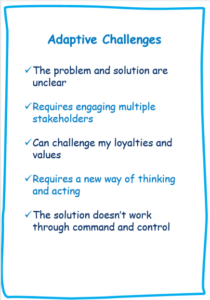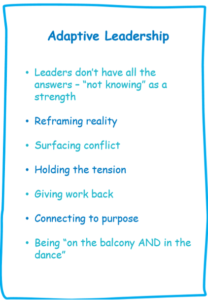Leadership is critical, especially so in these times. As a leader, you cannot look after your people if you don’t look after yourself!
Here are some thoughts on what I have learned on my journey, which has helped me to find inner peace so that I have the energy to lead.
For much of my life, I have been a high performing leader, living with depression, but masking it well. Looking back here are some things that applied to me:
- I felt that I was an imposter, constantly faking it
- I kept it to myself that you I was struggling
- The good days were relatively normal, but the bad days were unbearable
- Getting through the bad days required an enormous amount of energy
- I suffered from insomnia
If any of these apply to you, then whilst you can still be a high functioning leader, you could be suffering from depression and it is vital that you seek medical help.
What I have learned about leadership
Being an ‘adaptive’ leader is vital at this time. I believe that a leader needs to have as many of the following attributes, as possible:
- being highly self-aware of your own emotions
- deep listening skills and emotional intelligence
- generating positive energy that infects others
- not knowing all the answers and being able to bring others together and foster healthy disagreement
- empowering and trusting people, rather than commanding and controlling people
- a strong moral compass
- compassion
- having a strategic mind
- being a great storyteller
- being relentless in implementation
The problems we face as leaders today are ‘adaptive’ (problems to which there are no easy solutions) rather than ‘technical’ (problems to which there are known solutions). Many people who become leaders in professional services firms do so because they are technically excellent, rather than having adaptive leadership skills. The pictures below show the difference between ‘technical’ and ‘adaptive’ challenges and leaders.
Credit: Malcolm and Lisa Doig, Corporate Evolution
Why is ‘being highly self-aware’ so important for leaders?
In his book: Emotional Intelligence, Why It Can Matter More Than IQ, Daniel Goleman details ‘self-awareness’ as one of the core components of emotional intelligence. He describes self-awareness as the ability to identify and monitor our emotions and thoughts from moment to moment.
So being a self-aware leader, means you’re going to be aware of how you feel, and more importantly how your emotions and actions will impact on the people around you. A good way of conceptualising this is shown below
Credit: Malcolm and Lisa Doig, Corporate Evolution
How we behave is driven by how we think and feel. How we think and feel is driven by what we value (our Values and the priorities between them). What we value is determined by our needs, met and unmet.
Nearly all human beings value, being:
- safe – financial security and our health
- loved and having a sense of belonging
- good at something
(Maslow’s Hierarchy of Needs)
The Amygdala Hijack – understanding what triggers you
The term “amygdala hijacking” was first used by psychologist Daniel Goleman book referred to above. It refers to an immediate and intense emotional reaction that’s out of proportion to the situation. In other words, it’s when someone “loses it” or seriously overreacts to something or someone.
When we are triggered we pump cortisol and adrenalin, getting us ready to fight, flee or freeze. Our neocortex (thinking part of the brain shuts down and our ability to listen to others also shuts down. Not a good spot to be in as a leader making crucial decisions.
Funnily enough, what subliminal triggers us is often when we feel we are not:
- safe enough
- liked, respected or loved enough
- good enough
So being self-aware is all about recognising when we are triggered, pausing, breathing and taking stock. This re-enables our ability to think and listen more deeply, and thus be able to lead.
Remaining calm under pressure = optimal performance
The ability to manage your emotions and remain calm under pressure has a direct link to your performance. Research undertaken by Yale University, with more than a million people, has found that 90% of top performers are skilled at managing their emotions in times of stress in order to remain calm and in control.
The Yale study also found that prolonged stress causes degeneration in the area of the brain responsible for self-control. The tricky thing about stress (and the anxiety that comes with it) is that it’s an absolutely necessary emotion. Our brains are wired such that it’s difficult to take action until we feel at least some level of this emotional state. In fact, performance peaks under the heightened activation that comes with moderate levels of stress. As long as the stress isn’t prolonged, it’s harmless.
However, this effect is only seen when stress is intermittent. As soon as the stress continues beyond a few moments into a prolonged state, it suppresses the brain’s ability to develop new cells and also increases your risk of heart disease, depression, obesity and your cognitive performance.
Fortunately, though, unless a lion is chasing you, the bulk of your stress is subjective and under your control. Top performers have well-honed coping strategies that they employ under stressful circumstances. This lowers their stress levels regardless of what’s happening in their environment, ensuring that the stress they experience is intermittent and not prolonged.
10 things you can do to keep yourself mentally healthy under pressure
While I’ve run across numerous effective strategies that successful people employ when faced with stress, what follows are what I think are 10 of the best. Some of these strategies may seem obvious, but the real challenge lies in recognizing when you need to use them and having the wherewithal to actually do so in spite of your stress.
- Gratitude – taking time to contemplate what you’re grateful for isn’t merely the “right” thing to do. It also improves your mood, because it reduces the stress hormone cortisol by 23%. (Research conducted at the University of California)
- Avoid Asking “What If?” – “What if?” statements throw fuel on the fire of stress and worry. Things can go in a million different directions, and the more time you spend worrying about the possibilities, the less time you’ll spend focusing on taking action that will calm you down and keep your stress under control.
- Disconnect – Given the importance of keeping stress intermittent, it’s easy to see how taking regular time off the grid can help keep your stress under control. Forcing yourself offline and even—gulp!—turning off your phone gives your body a break from a constant source of stress. Don’t have the phone in your bedroom at night!
- Limit Their Caffeine Intake – Drinking caffeine triggers the release of adrenaline. Adrenaline is a source of the “fight-or-flight”. The fight-or-flight mechanism sidesteps rational thinking in favour of a faster response. So one cup of coffee in the morning.
- Sleep – I can’t say enough about the importance of sleep to increasing your emotional intelligence and managing your stress levels. When you sleep, your brain literally recharges, shuffling through the day’s memories and storing or discarding them (which causes dreams), so that you wake up alert and clear-headed.
- Squash Negative Self-Talk – A big step in managing stress involves stopping negative self-talk in its tracks. The more you ruminate on negative thoughts, the more power you give them. Most of our negative thoughts are just that—thoughts, not facts. When you find yourself believing the negative and pessimistic things, literally stop what you’re doing and write down what you’re thinking. Once you’ve taken a moment to slow down the negative momentum of your thoughts, you will be more rational and clear-headed in evaluating their veracity.
- Reframe Their Perspective – Stress and worry are fuelled by our own skewed perception of events. It’s easy to think that unrealistic deadlines, unforgiving bosses, and out-of-control traffic are the reasons we’re so stressed all the time. You can’t control your circumstances, but you can control how you respond to them. So, before you spend too much time dwelling on something, take a minute to put the situation in perspective.
- Breathe – The easiest way to make stress intermittent lies in something that you have to do every day anyway: breathing. The practice of being in the moment with your breathing will begin to train your brain to focus solely on the task at hand and get the stress monkey off your back.
- Meditate or practice Mindfulness – The science of meditation is now indisputable. It gives us a better grasp of how to work with situations, a heightened awareness of our emotions, and more space to respond. Meditation is a simple technique that, if practiced for as few as 10 minutes each day, can help you control stress, decrease anxiety, improve cardiovascular health, and achieve a greater capacity for relaxation.
- Exercise – reduces levels of the body’s stress hormones, such as adrenaline and cortisol. It also stimulates the production of endorphins, chemicals in the brain that are the body’s natural painkillers and mood elevators. Virtually any form of exercise, from aerobics to yoga, can act as a stress reliever. If you’re not an athlete or even if you’re out of shape, you can still make a little exercise go a long way toward stress management.
Closing Thoughts
I now find that I experience significantly more inner peace than I did in the past, which helps me in the work I do with leaders and emerging leaders. I hope what I have learned will help you to find greater inner peace.
About the Author
John is the Principal of People, Passion & Performance and has deep ‘hands-on’ experience in creating and developing workplaces where people have a shared vision and purpose, so that the people thrive and the organisation flourishes sustainably.
John coaches leaders and emerging leaders to live without fear and to develop and enhance their people skills so that they fully motivate, engage and empower their people to succeed in these volatile, uncertain, complex and ambiguous times. His purpose in life is to help those in his sphere of influence to find a deeper purpose, meaning and joy in their life.
John also helps leaders to develop and implement cultural change projects and to develop values that have meaning to the organisation. He speaks on leadership, organisational change and has a passion for assisting organisations to build mentally healthy workplaces.
John was formerly the Australian Managing Partner and CEO of Squire Patton Boggs, a top 10 Global Law Firm which is one of the fastest-growing law firms in Australia, with offices in Perth, Sydney and Darwin.
 |
Email: [email protected]
Ph: 0412 287 563 LinkedIn: www.linkedin.com/in/john-poulsen-0509a714 Website: www.peoplepassionperformance.com.au |




